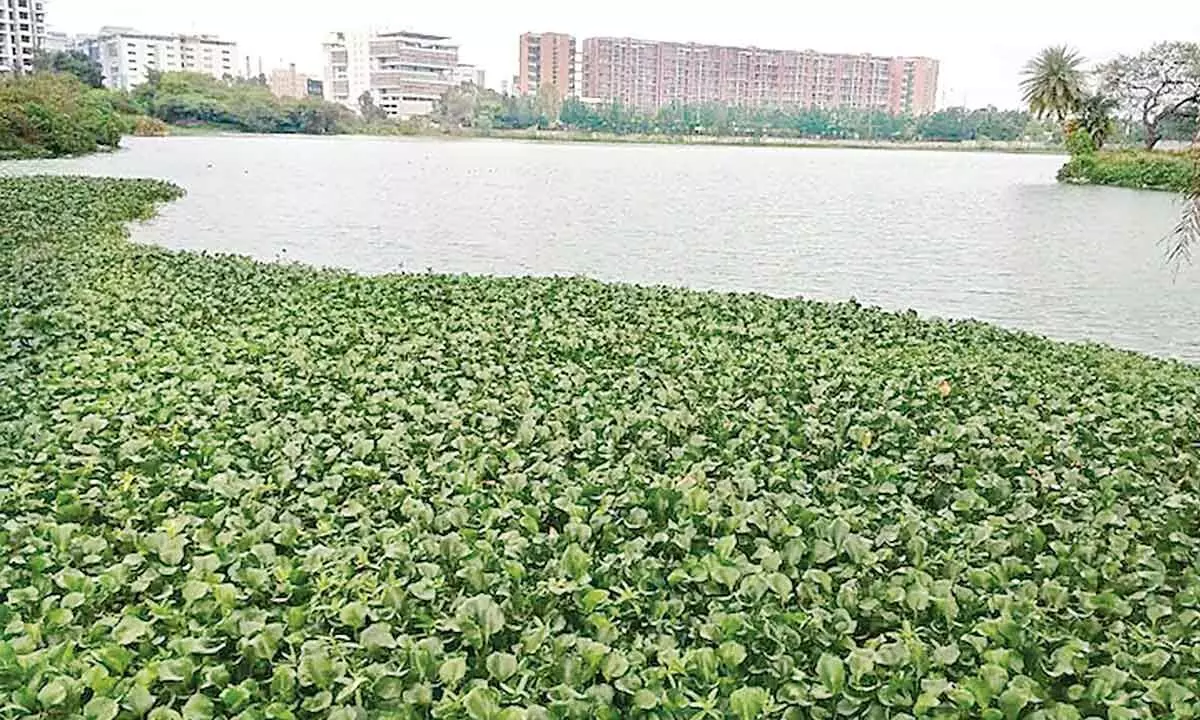Live
- Seven-day national mourning in respect of Dr. Manmohan Singh
- 'I've lost a mentor and guide': Rahul Gandhi grieves demise of Dr. Manmohan Singh
- 'Great loss for all of us': President Droupadi Murmu mourns Manmohan Singh's demise
- Dr Singh presented milestone budget of 1991 which liberalised Indian economy: FM Sitharaman
- PM Modi condoles demise of Dr. Manmohan Singh
- Former Prime Minister Manmohan Singh Dies at 92: A Legacy of Economic Reforms
- Nagesh Trophy: Telangana, Gujarat dominate action on Day 4 with easy wins
- Get Ready for Dreame Technology’s Year-End Amazon Sale – Big Savings on Smart Home Products
- FIR registered as 4 voter forgery cases come to light in Delhi's Okhla constituency
- Ayodhya Ram temple to host majestic anniversary celebrations on Jan 11 with devotional, cultural programmes
Just In

BBMP has a tough job to protect water bodies by preventing encroachments, sewage flow, dumping plastic
Bengaluru: Bengaluru has lost several lakes due to the contamination of water and encroachments. A recent report suggests that 19 lakes have ceased to exist and only 21 are free from encroachment out of 210 lakes in the city. While some have turned garbage dumps, slums have come up on others. Some lakes need to be repeatedly revived due to the lack of regular maintenance.
Dense growth of invasive weed, algal blooms (eutrophication) take their own toll on the water bodies; sewage flow drives another nail into the lakes.
Usha Rajagopalan, lake conservationist and trustee of PNLIT (Puttenahalli Neighbourhood Lake Improvement Trust) speaks about rejuvenation and maintenance of the lakes. She explains that the growth of weed has a lot to do with the poor quality of water. "Weeds are grown only due to the poor quality of water; this leads to the dense growth of invasive aquatic plants.
Any plant which grows to an extent that it covers the surface of the water is ultimately going to kill the water. We try to improve the quality of water, stop the sewage from entering and keep a close a watch on the rainwater drains since sewage enters from this point.
At the very first sight of this, we call up the BWSSB office and stop this immediately. When it is beyond our control, we discuss the issue with the BBMP and higher levels of BWSSB. We don't allow sewage to enter the lake," she says.
Improving the quality of water can be carried out by two methods. "This is possible either by the installation of fountains, or by setting up artificial floating islands which work on the principle of hydroponics (a method of growing plants without soil). Aquatic plants with free floating roots absorb the nutrients and grow in the second method. Beyond this, if the plants grow, we have four trained gardeners who keep unwanted weeds under control," she adds.
Lakes and ponds can become breeding grounds for mosquitoes which can develop into an issue for those who live nearby. When lakes and ponds contain mosquito eggs or larvae, it is usually a sign of an underlying problem with the quality of water. Insufficient aeration, poor water quality and lack of natural predators are a few reasons for an increase in the population of mosquitoes.
"All lakes and ponds have stagnant water. Mosquito breeding again depends on the quality of water. There are three ways to keep this under control, one is about maintaining the quality of water. Apart from this, introducing fish like Guppies (Poecilia reticulata) which consume mosquito larvae can help. There's also a plant called Chinese chaste tree (Vitex negondu) which helps in preventing mosquito breeding. Although this can't be eradicated completely, such measures can be taken to avoid breeding of mosquitoes," she explains.
Lakes have turned into dumping grounds for pounds of plastic. The unchecked disposal of plastic on a large scale has a huge impact on marine life and the environment, therefore, reducing plastic waste is extremely important. "Each one of us can use plastics as little as possible and reuse it as much as possible.
These things will take time and every one of us are responsible for this. Sometimes, individuals throw plastic bags and it would've reached the bottom of the lake by the time somebody notices it. Some gardeners remove the floating waste out of the water and dispose it. Hence, it is entirely up to us to stop using plastics.
Every individual should realise that it isn't their convenience that has to be prioritised but, the long-term damage it causes to the environment. Lakes, plastics or any public place, the onus is on us. It is important to take an action when something wrong is happening instead of being a bystander," she expresses.
Stop complaining and start acting. "When the BBMP has rejuvenated a lake, the subsequent maintenance of it is extremely important. When you look at a lake in your locality, sinking and full of sewage, act on it instead of complaining.
You can kill a lake overnight but it takes patience and time to get the government to revive it and for you to maintain it but, it can definitely be done. You won't be able to manage it if you are doing it alone however, if your entire community participates, it is absolutely possible," she concludes.

© 2024 Hyderabad Media House Limited/The Hans India. All rights reserved. Powered by hocalwire.com







